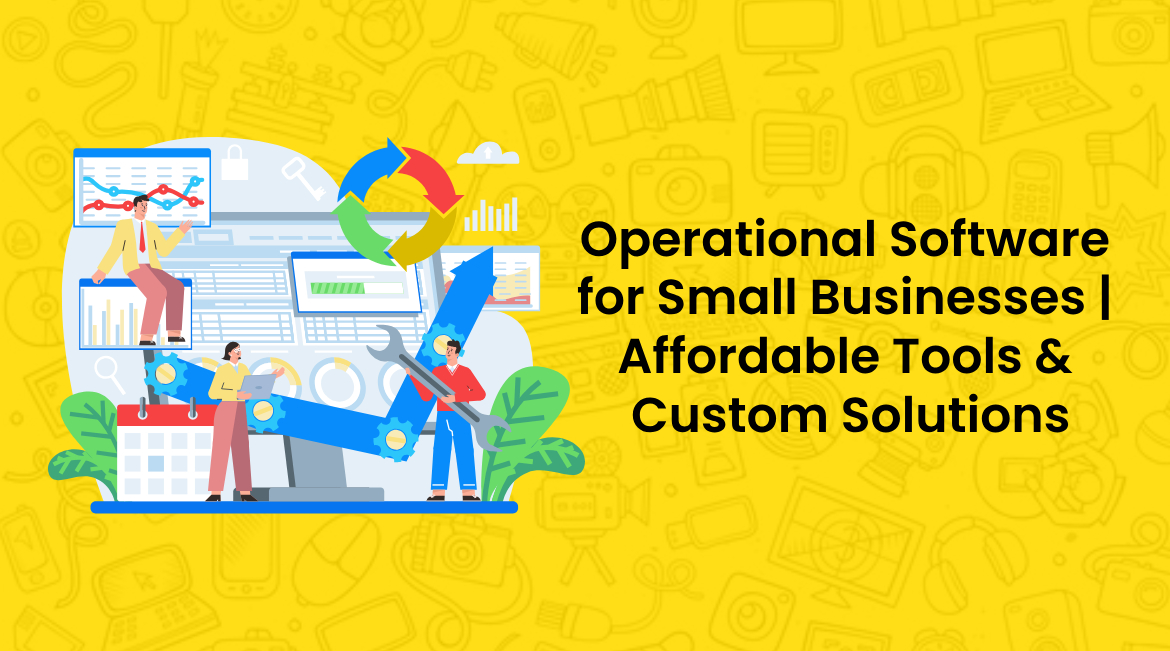Operational Software for Small Businesses: Affordable Tools for Maximum Efficiency
In today’s fast-paced digital era, small businesses are increasingly turning to operational In today’s fast-paced world, managing operations effectively and timely has become the key to success in any business. Small businesses are increasingly leveraging operational software to streamline their processes, increase team efficiency, and stay ahead of the competition. Whether it’s about assessing their inventory or handling sensitive consumer relations, the right operational software can make all the difference in the world.
Let’s dive into some of the advantages and disadvantages of operational software and custom software, and how small businesses can use them to maximize their productivity.
Why Small Businesses Need Operational Software
Running a small business often means it’s a one-person operation rather than having a team for each and every wing. As a result, you are juggling various tasks on a daily basis and to ensure that your business is thriving in this competitive world, it is crucial that every part of your machine functions seamlessly.
This is where operational software becomes essential. Here are some reasons why it can make a significant difference:
Efficiency Boost: Repetitive tasks can often become boring and this might lead to human errors. Automating this process can easily free up some time for you and your team.
Cost-Effective Operations: This ensures reduced wastage of resources and hence on a long run can influence your balance sheet.
Enhanced Decision-Making: These software gives real time data analysis enabling you to track and improve performance in real-time.
Scalability: Scaling up your business is always and next step and operational softwares can scale up as you go.
Affordable Operational Software Tools for Small Businesses
The market is filled with all kinds of operational softwares, ranging from platform which have a plethora of services and some which are case-specific. Small business usually don’t need some expensive version which is going to increase their burn rate but rather a low costing one which will efficiently help them. These are some popular ones.
Project Management
Trello: It is a popular visually advanced tool effective for small teams and keeping track of your projects.
Asana: Ideal for keeping track of your team, assigning tasks and deadlines.
Accounting and Finance
QuickBooks: Its an excellent financing tracking software which is used to create and raise invoices.
Wave: A free accounting platform perfect for small startups and solopreneurs.
Customer Relationship Management (CRM)
Zoho CRM: They are the go-to solution for handling customer relations. Armed with chat and support options, this the perfect way to keep your customers happy.
HubSpot CRM: Similar to Zoho but charges a premium for services.
Human Resources and Payroll
Gusto: This is an extremely viable HR management platform.
BambooHR: Leave management, payroll, resignations etc. can all be handled by this alone.
Custom Software Development for Small Businesses
While off-the-shelf tools are affordable and easy to use, they may not always align perfectly with the unique needs of a small business. This is where custom software development comes in.
While ready-made softwares are affordable and easy to learn and use, they may not be what you are looking for your business. This is where custom software can save you and give you tailored solutions specific to your business. Custom software development is getting more and more popular these days and hence has become really cheap.
Advantages of Custom Software:
Tailored Functionality: Custom softwares are tailored for specific use cases, you can rename the functionalities and add modules which are specific to your business.
Scalability: Custom softwares evolve with your business as you grow. You can always update the software according to your needs.
Integration: You are not bound by the specification requirements of off-the-shelf softwares, rather you can integrate custom softwares in your existing systems.
Cost Considerations:
Cost will always be a hurdle in the case of custom software development. However new architectures and features are coming in to make the process cheaper. Companies are coming with no-code platforms which can help you build your own software with your requirements for a nominal fee.
How to Choose the Right Operational Software
Here are some tips to help small businesses make the right choice:
Identify Business Needs: Analyze your existing operational pipelines using traditional methods and determine which of them need fixing.
Budget Planning: Consult someone for the financial needs of your company both short and long term to determine your budget.
Ease of Use: Make sure to choose software which everyone can use with minimal tech support.
Scalability: Ensure the software is free of future restrictions. It should grow with your business.
Trends in Operational Software for Small Businesses
In the year 2025, here are some upcoming trends you should be on the lookout for.
AI and Machine Learning: Predictive data analysis using AI are being integrated into these softwares. Instead of giving you just an excel sheet, these algorithms are capable of identifying areas of low productivity.
Cloud-Based Solutions: Cloud based softwares are easier to scale rather than ones with servers in your own office.
Mobile-First Software: Complex softwares are coming with easy-to-use mobile applications. Although they come with reduced functionality, they are capable of giving you insights even at 36000 ft in the air.
Conclusion
Final Thoughts
For small business, using operational softwares is not just a luxury, it has become absolutely essential. If you are an entrepreneur and you are just starting out, having a good operational software in hand will save you a lot of time and money on the long run. By leveraging the right tools, small businesses can achieve maximum efficiency and set themselves up for long-term success.
company. Knowing about these emerging technologies can home in handy somewhere along the line where you can save your time and money by using these in your day-to-day like or work to make it easier.







